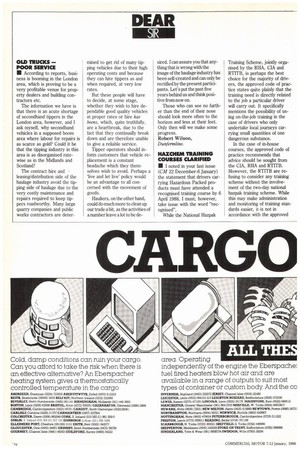NAZCHEM TRAINING COURSES CLARIFIED • I noted in your last
Page 26

Page 27

If you've noticed an error in this article please click here to report it so we can fix it.
issue (CM 22 December-6 January) the statement that drivers carrying Hazardous Packed products must have attended a recognised training course by 6 April 1988, I must, however, take issue with the word "recognised".
While the National Hazpak Training Scheme, jointly organised by the RHA, CIA and RTITB, is perhaps the best choice for the majority of drivers, the approved code of practice states quite plainly that the training need is directly related to the job a particular driver will carry out. It specifically mentions the possibility of using on-the-job training in the case of drivers who only undertake local journeys carrying small quantities of one dangerous substance.
In the case of in-house courses, the approved code of practice recommends that advice should be sought from the CIA, RHA and RTITB. However, the RTITB are refusing to consider any training scheme without the involvement of the two-day national hazpak training scheme. While this may make administration and monitoring of training standards easier, it is not in accordance with the approved code of practice.
It is the clear legal duty of the operator to ensure that his drivers are properly trained. This may involve the use of the national two-day scheme but it is quite wrong to claim that this is the only method to comply with the requirements of the law.
Parry Davis, Transport Consultancy Services, Northwich, Cheshire.
































































